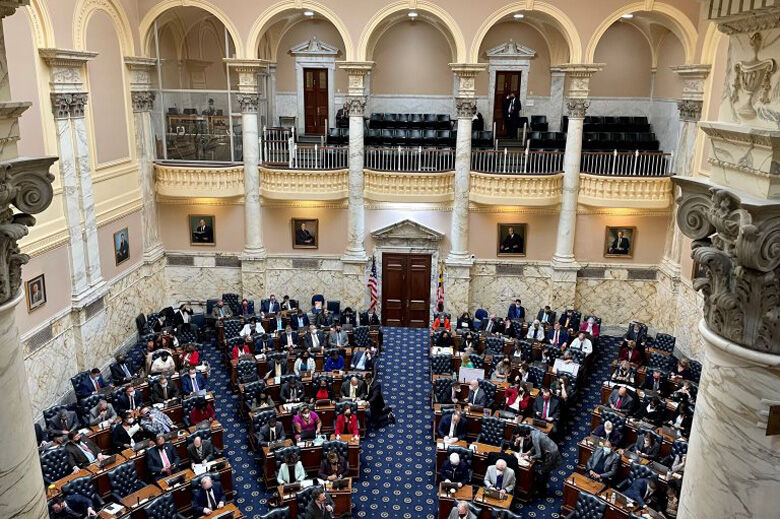This article was republished with permission from WTOP’s news partners at Maryland Matters. Sign up for Maryland Matters’ free email subscription today.

This content was republished with permission from WTOP’s news partners at Maryland Matters. Sign up for Maryland Matters’ free email subscription today.
On Monday evening, Maryland House lawmakers voted to enact several bills that were overridden by the Senate earlier in the day, officially putting them on the books.
In a 95-41 vote, delegates voted to override Senate Bill 9, which would change the collective bargaining process within the University System of Maryland. More specifically, it would require the chancellor of the University System of Maryland to act on behalf of all the system’s institutions in all aspects of collective bargaining, consolidating the process at the top.
Unions have been fighting for a consolidated bargaining process for years. Previously, across USM’s 12 institutions, there were 16 different contracts that were negotiated. When an individual campus reaches an agreement with a bargaining unit, it must then get approved by the system-wide chancellor. If rejected, the bargaining process starts over again.
Union leaders had argued that this was an inefficient and expensive system.
“AFSCME Council 3 is thrilled that the House and Senate have overridden Gov. Hogan’s veto of SB 9. Our leaders and members are anxious to get started on fixing inequities that are throughout the university system, including those around health safety, workers rights and pay equity,” said Stuart Katzenberg, spokesman of American Federation of State, County and Municipal Employees Council 3.
When the bill passed both chambers last legislative session with veto-proof majorities, the union tried to get started with the consolidated bargaining process, but the University System of Maryland refused, he added. But “now they will have to, and we look forward to meeting them to do what’s right by workers,” he continued.
In addition to Senate Bill 9, House lawmakers overrode Hogan’s vetoes on three other bills that became law Monday evening:
Senate Bill 30, which will increase the notice required by the governor before submitting budget cuts to the Board of Public Works to seven days, was overridden on a vote of 96-40;
Senate Bill 780, which will require the governor and his cabinet members to notify the Legislative Policy Committee within three days of executing an emergency contract during a state of emergency, was overridden on a margin of 118-17; and
Senate Bill 829, which creates a statutory definition of what constitutes an emergency when entering into emergency procurement contracts and requires the attorney general, the secretary of the Department of Transportation and the special secretary for the Governor’s Office of Small, Minority, and Women Business Affairs to provide guidelines for state agencies to follow when determining the ideal participation goal for minority business enterprises when entering into emergency contracts, was overridden on a vote of 104-31.
With minimal debate, delegates voted to override several bills originating in the House chamber, including a bill sponsored by Del. Jessica M. Feldmark (D-Howard and Baltimore County) to harden deadlines for local government agencies to submit planning proposals to the Maryland–National Capital Park and Planning Commission for review and legislation sponsored by Del. J. Sandra Bartlett (D-Anne Arundel) to permit Anne Arundel County to impose a higher transfer tax on certain real estate deals and use the excess money to fund affordable housing programs.
The House voted to sustain vetoes on a series of other duplicative bills. Both chambers are slated to continue debating veto overrides during floor sessions Tuesday.







